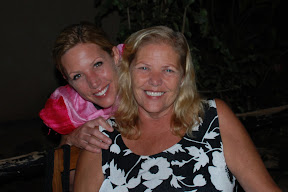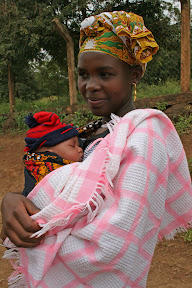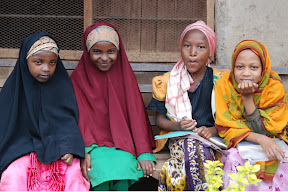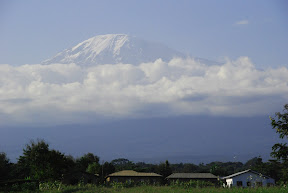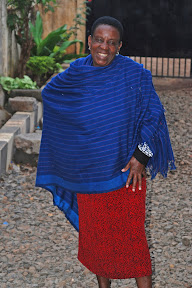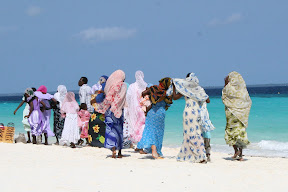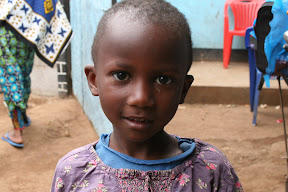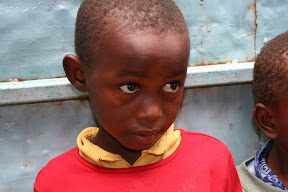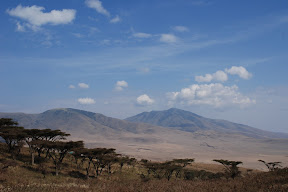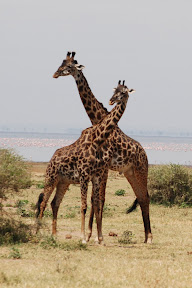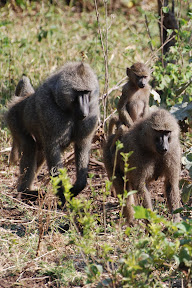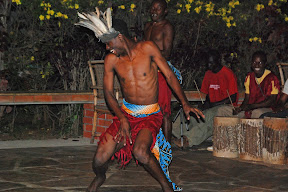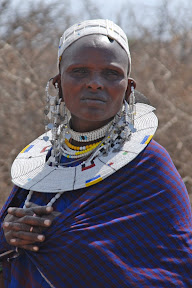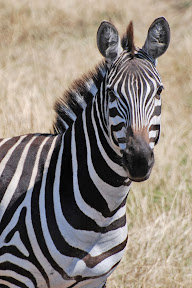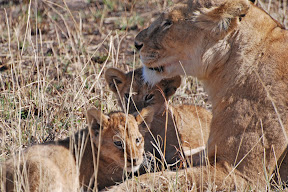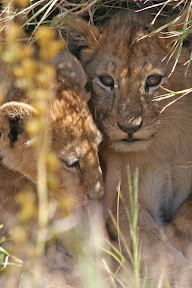Our ride to Arusha is uneventful. We are both a bit quiet and weepy.
The scenery becomes more green and lush as we rise in elevation towards
Arusha. We pass miles of beautiful, healthy looking, coffee orchards.
The houses get bigger, the traffic heavier.
We arrive at our hotel around 5pm. We immediately send our clothes
off to be washed so we can start our safari with clean clothes. Again,
we are excited with the prospect of having clean clothes and a hot bath.
We both eat an extra large dinner at the buffet in the hotel restaurant
and are to bed early.
Today is our first day of safari – we meet in the lobby at 8am. We
will be traveling with Dee, a lady about my age that just climbed Mt. Kilimanjaro
and our guide, Joseph. Our first stop is Lake Manyara, about an hours
drive away. During the drive, the landscape slowly changes from lush
and green to dry and sparse. The way is dotted with Masai villages,
huts made from cow dung and young boys in colorful kangas herding their
cows and goats.
The government of Tanzania is very serious about protecting their natural
wonders. There are many National Parks and Conservation areas.
The roads to these areas are well-maintained paved highways. The interior
roads are hard packed dirt. No one is allowed off the roads and no
one is allowed out of the vehicles except in established rest areas.
There is no rubbish anywhere to be seen. A sign at one of the parks
reads: “Remove nothing from the park except: Nourishment for the soul:
Consolation for the heart: Inspiration for the mind."
Lake Manyara is a National Park known for its bird life. It has one
of the highest concentrations of flamingos in the world. Within a
few minutes of entering the park our guide, Joseph, spots a Black Mambo
sunning itself on the side of the road. He comments how rare it is
to see one. A short distance later, we see a group of giraffes, eating
from the tops of acacia trees that look a lot like kiawe trees. I
am enchanted with them. They are so graceful and elegant. I am so
content at seeing them that I think to myself, that I would be fine if we
don’t see another thing.
We continue the drive amongst zebra and impalas and monkeys. The lake comes
into view and almost looks like a mirage ringed in pink from the thousands
of flamingos lining its shore. After a short stop for a picnic lunch
we are back in the car. In just a few minutes we spot a lion laying
a distance away in the shade, Jo comments that it is rare to see lions here.
Another short drive and we are treated to a group of elephants so close
to the car that I can’t use my zoom lens to photograph them. One lone
male is throwing dust from an old termite hill onto himself to kill the
ticks. He is so close I can almost touch him. We stay and watch
him for a while and he puts on quite a show. As we leave he starts to follow
us and then charges the jeep coming in the opposite direction as it gets
between us. I think he liked us….
Within just a few minutes we come upon a group of baboons on the side of
the road. We enjoy watching them as they chase each other, the older
ones scolding the young ones and the babies riding on the mother’s back.
As we are watching, we notice many baboons coming out of the trees a short
distance away. They are coming toward us and they keep coming and
coming and coming until literally hundreds of baboons surround us.
I feel honored and am in awe. We move on to the hippo ponds and see
more lions and monkeys all at a distance.
We arrive at our lodge just before sunset. We are greeted with washcloths
to wipe off some dust and a glass of juice. While we are checking
in we are told that electricity is on from 6 to 12 and hot water from 7
to 10. I had never heard anything like that before but, we are in
the middle of no-where. After checking in, we shower and head to dinner
which is quite a lavish buffet. There is local entertainment at dinner,
which is the first authentic African music that I have heard. The
only music that I heard in Moshi was from the music stores in town which
blasts rap and American hip hop. After dinner the musicians put on
a great show on the patio. The dancing is very energetic, primal and
sensual.
I wake in the morning and we have coffee on the lanai in front of our room,
which is bordered by plumeria and bougainvillea. We are headed to
the Serengeti today. We drive around the rim of the Ngorogoro Crater
Conservation area, which is about 7000 feet in elevation on a narrow, windy
road. It is very foggy. As we descend from the rim the landscape
becomes drier and more barren. I am surprised to see Ostrich there.
After several hours of driving we stop at a Masai Village for a tour.
We are warmly greeted with the men on one side of the entrance and the women
lined up on the other. Their clothing is very colorful, they
are adorned in their lavish beaded jewelry. They are singing and doing
their traditional “jumping” dance. They encourage us to join them,
placing their wide beaded necklaces over our heads and bringing us into
their circle. A young man that speaks very good English greets us
and tells us that he will be our guide. He takes us into one of their
huts that is made of acacia branches and cow dung. The Masai are nomads
and they only stay in one place for about a year. The hut is very
small and there is a fire burning in the middle creating a very smoky atmosphere.
We sit and talk and he tells us about their culture. They can have
up to 10 wives. Each wife gets her own hut. Basically the women
do all the work and get no say. Everything is done as a community.
Food and “money” is shared by all. The community is “ruled” by a group of
elders whose decisions are final. He went on to say that he had literally
been taken off of the side of the road at the age of 7 and taken to a government
school. When he returned, the elders chose him to be a guide because
of his English skills.
Then he asked me a question I will never forget - “Will Obama win
the election?” Never in a million years did I ever think that I would
be in the middle of the Africa, sitting in a cow dung hut, talking politics.
It was definitely an interesting moment.
When we left we headed off-road across the open plains. We ended up
at Oldapai Gorge where the Leaky family has made many fascinating discoveries.
We spent about an hour there, toured their small museum and had lunch while
listening to a lecture. Headed off for the Serengeti, which was still
a 5-hour drive away.
We drove for hours and hours through nothing but flat, dry grasslands. On
our way we made a quick stop at a watering hole where we found a large male
lion about 20 feet away, sleeping and completely unperturbed by our presence.
We continued our hot dusty drive for many more hours passing antelope and
migrating zebra and wildebeests. It was a very long day of driving
and we were all happy to arrive at the lodge.
The lodge is literally built into a rock out cropping. One large boulder
actually serves as the wall in the dining area. It was reminiscent
of a Frank Lloyd Wright design and had fabulous views of the Serengeti.
Again, we were told electricity is on from 6 to 12 and hot water from 7
to 10, so funny. Invited Joe, our guide, to join us for dinner and
enjoyed learning more about him and his life. Joseph was a biology
teacher in the past, which explained his vast knowledge of the animals and
plants that we were seeing. He has four children and we learned that
custom dictates that the first-born child is given to the father’s parents
to raise and then that child assists the grandparents when they are grown.
The second born is given to the mother’s parents to raise. In the
past only the sons had rights of inheritance but he informed his children
that it would be different for them and all of them would inherit equally.
It was a delightful dinner and when it was done we all retired to our beds
after a long day of driving.
Woke up early and watched the sunrise over the Serengeti – how cool.
Jeni decided to stay at the hotel for the morning game drive so I set off
with Dee and Joe. The annual migration of wildebeests and zebras take
place at this time of year and we see long lines of animals in the distance
for as far as the eye can see.
I am very struck by the vastness of the Serengeti. It is very isolated
and detached from the world. No phones, no TV or radio, no internet.
The world could have gone to hell and we would have never known. The
jeep we were traveling in allows us to stand up with our heads out the top.
That vantage point allows me to feel so much more connected with the land.
We arrive at a watering hole that looks like a small oasis in this dry acacia
woodland. We see zebra and wildebeests lined up the hill as far as we can
see waiting to come down for a drink. We turn off the engine and Jo
tells us to be quiet. These animals have a very symbiotic relationship and
often travel together. The zebras have good eyesight and poor hearing.
The wildebeest have good hearing and poor eyesight. Wildebeest eat
the short grasses and zebra eat the tall grass so it is a wonderful relationship
for both of them.
We wait quietly for about 10 minutes. There appears to be two zebras
at the front of the line directing everything. They raise their heads
and give out a call and the entire line begins their decent to the water.
They enter the water a little ways down river of us and after they drink
they cross the river and come up the bank and into the field that we are
parked in. Animal after animal comes in, drinks and then moves on
until we are entirely encircled by literally thousands of wildebeests and
zebras. The noises they made still ring in my ears as I write this.
To see the animals at a distance is exciting but to be encircled by them
and literally become part of this eons old ritual is entirely another story.
It is hard to describe how it felt. I lost all track of time. I felt
at one with all creation. It was a spiritual experience. It was humbling.
It was a reminder that every living thing plays an important part in this
shared creation. All I could say at the time was, “this is so amazing”,
over and over again.
We returned to the Lodge for lunch and to pick up Jeni for the afternoon
game drive. A short drive up the road Jeni spots two young male
lions lying under a tree with their kill, a cape buffalo. They had
eaten their fill and were guarding it. Continuing our drive we see
a mother and two young hyenas. We arrive at a large hippo pool and find
them much more active then the ones we had seen the day before. Hippos
are nocturnal so they frequently appear to be nothing more than large lumps
in the water during the day. This pool was very full and they seemed
to be jockeying for position. One male was quite aggressive and it
was quite impressive to witness his strength and power. As we leave
the hippos, I mention to Joe that we haven’t seen a cheetah yet and that
if he finds one I will give him an extra tip.
The guides use two-way radio to communicate with each other and after a
short chat with another guide he starts speeding down the dusty, bumping
road. He had never driven that fast before and I suspected that I
was about to see my cheetah. We see a group of safari vehicles on
the side road ahead of us, and Joe says, “Get your money ready”. There he
is, a magnificent cheetah. He is quite a distance away, no more than
a spot in the grass to the naked eye but with the zoom lens on my camera
he is magnificent. He’s eyeing two gazelle grazing a short distance
away. We wait and watch, wondering if he will go for the gazelle
but decide to leave as the sun slips towards the horizon.
Arrive at our new lodge, have a shower and dinner and go to bed still in
awe and amazed at the events of the day.
Woke the next morning to strange noises outside our window. Pulled
the curtains back to find a group of black faced monkeys sitting on the
banister trying to get in our window. We opened the window to shoo
them away but they come towards us, determined to get into our room.
Again, I am amazed at how the animals are not afraid of us.
Downstairs at breakfast we run into one of the staff members with an Obama
button. Here in the middle of nowhere, an nine hour drive to the nearest
city and we find an Obama supporter.
It is our final day on the Serengeti. We head out and quickly come
across a herd of elephants with babies at their side, so cute. A short
distance further we see a mother lion and two cubs feasting on a recent
kill. One of the cubs is quite aggressive, trying to take the food
out of the mother’s mouth, she is loudly teaching him some manners.
Jeni comments, this must be our day for babies.
Within a few minutes we spot a lone female lion very close to the side of
the road. She is magnificent, regal and proud. Her attention
is on something behind us and very soon Joseph is backing up 100 feet or
so. When we stop we are treated to two female lions with eight
cubs laying in a drainage-ditch not more than 10 feet from the car.
We are thrilled and snap picture after picture. One of the females
gets up and starts moving towards us. Although she does not appear
aggressive, we all go on alert. Jeni ducks her head back in the car,
I roll up the side window. When she reaches the side of the car she
plops down in the small sliver of shade that the car is providing.
We could have reached out and touched her but we settle for more photos.
It was an amazing moment and it provided one of my favorite photos from
the trip.
We move on a short distance away we see three male lions and one female,
very close to the road. Joseph explained that she is probably coming
into heat and that is why there were so many males surrounding her.
It was very sweet. They were courting her, rubbing up against her, nuzzling
her face.
Back on the road, and again only a few minutes away we spot a regal male
lion sleeping on the top of a rock outcropping. We decide to call
him Simba (the Swahili word for lion), he is the epitome of the “king of
the jungle”.
We head out of the Serengeti mid morning as we have a long day of travel.
Tonight we will be at staying on the rim of the Ngorogoro Crater, said to
have the largest concentration of wildlife of anywhere on earth. We
have booked a room at the Sopa Lodge, splurging on a “luxury” lodge for
our last night. We travel back through Masai land and begin our ascent
to the Crater Rim, which rises to 7000 feet above the plains. It grows
greener and greener, Jeni comments that it looks like the drive to Hilo.
The road is narrow and windy, in some places I see that there is only 10
feet or so on either side of the road before a steep cliff. We arrive
at the lodge late in the afternoon, it is beautiful and quite cool.
The rooms are large and the view is magnificent. We all have dinner
together and I am happy to find the bed soft and cozy.
Today we explore the Crater. I have been up before sunrise practically
every day since I have been here, today, I want to stay in this nice cozy
bed till the last possible moment. The drive into the crater is amazing.
So expansive, so vast, so incredible. The crater walls are steep,
the bottom of the crater vast. There is an alkaline lake in the center with
a ring of salt around it showing how far the water level has dropped since
the rainy season. The animals cannot drink from the lake although
there is bird life on the edges. There are small springs and streams
that run year-round and this is where the animals drink.
The crater is much busier than the Serengeti. We pass lots of other
safari vehicles and there is a crowd at every sighting. We see Cape
Buffalo, Wart Hogs (which always remind me of the Lion King), hyenas, hippos
in oasis like settings and the ever-present migrating zebra and wildebeest.
Stopped for lunch at a rest area where a monkey was being very persistent
in getting at our food, jumping on the car, trying to sneak up and grab
food from our plates. We are told not to feed him as it only encourages
bad behavior. A Japanese couple pull up and the man is filming the
monkey’s antics. The woman goes to the car and gets some food to feed
him. She throws a piece of food on the ground in front of her, which he
eats and then runs to her to get more. She panics and runs to the
car and doesn’t come out again.
We leave the Crater by way of a very steep, windy road and make our way
back to Arusha arriving late afternoon. Arusha is a much larger town, complete
with traffic jams and the ever-present street hawkers. On our last
day in Africa, we finally figure out how to handle them. If we use
the more slang greeting “Mambo” and the response of “Poa” they assume we
are not new here. When they ask, “Where are you from?” We reply “Moshi”,
they leave us alone.
We have two days here before heading home. We check out the Natural
History Museum, meet someone from the Big Island. We shop, have our
clothes washed, take hot baths.
Our trip home is very long – flight delays lengthen our travel time to 40
hours. I spend a few days in California before coming home.
It takes me weeks to become fully present here. I think I left part
of my being in Africa. We vow to return some day….
|
